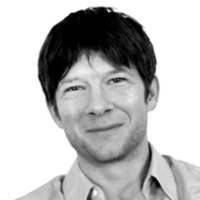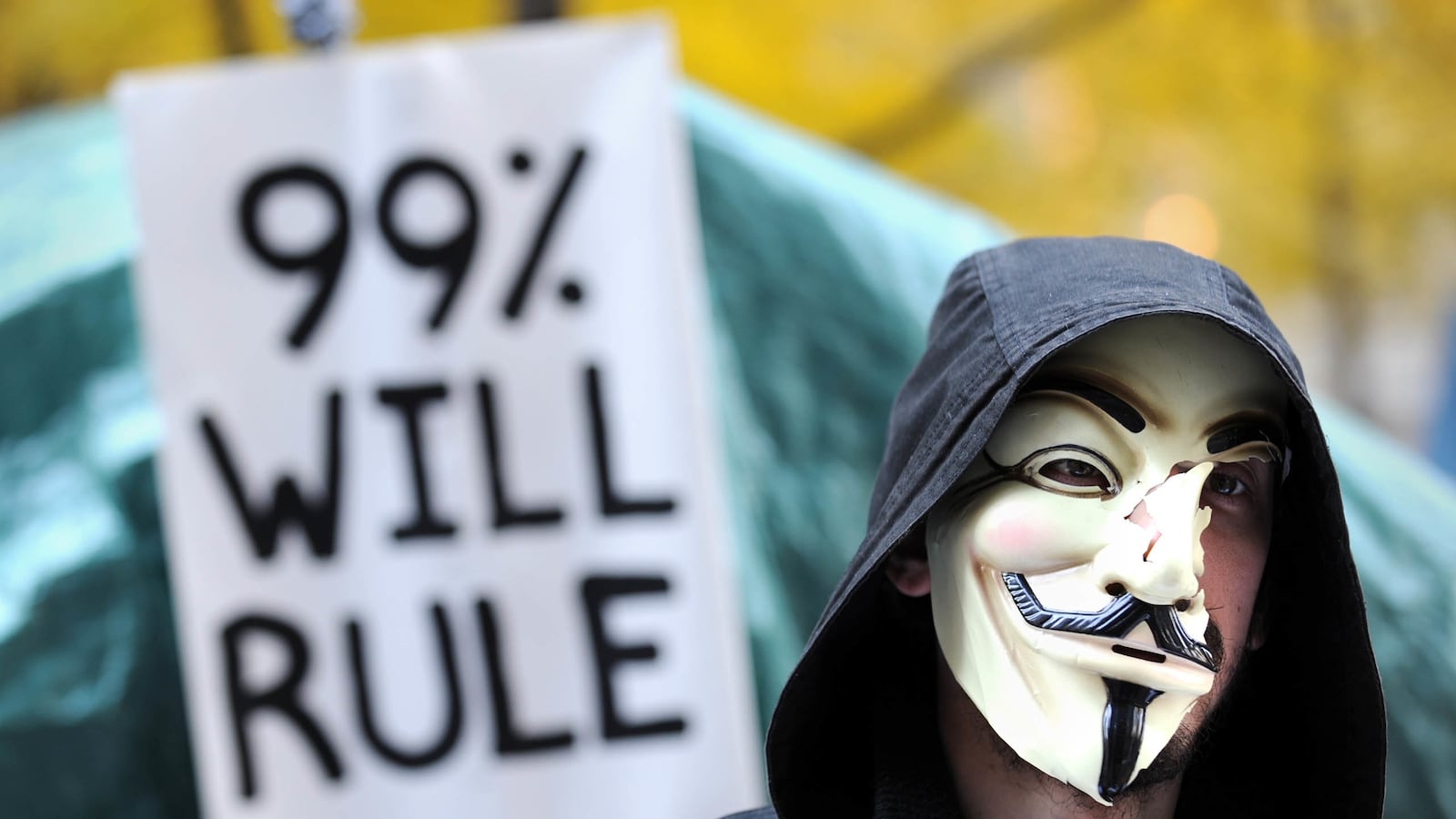The last six years have often been heady for someone who cares about progressive political movements. They have also been baffling, alternating between high hope and disappointment. The American left has been, in Matthew Arnold’s phrase, wandering between two worlds, one dead, the other powerless to be born.
At least it’s better than the Nineties, which, as a grotesque Mickey Rourke unforgettably reckoned in The Wrestler, sucked. That was a time of no movements, little dissent, and a conventional wisdom that held that all the important questions had been resolved at The End of History. There was nothing left to do except steer the globalization of American-style capitalism through native discontents and bumps in the road of political economy.
There was a small but growing anti-globalization (or, as its members preferred, alter-globalization) movement, which disrupted meetings of the International Monetary Fund and World Trade Organization. Its growing presence was derailed in the United States by the fever that took over U.S. politics after the attacks of September 11, 2001. That fever was the major fact in our politics for at least three years, and dissent seemed almost impossible, even as it became increasingly clear that the Bush administration was taking the country’s foreign policy in dangerous directions.
Howard Dean’s 2004 campaign broke the silence, and the enthusiasm for him among Democratic activists was a response to his willingness to say what had seemed unsayable, that the war in Iraq was a bad idea and should end as quickly as possible. His campaign-ending primal scream had a Freudian fittingness: he was the country’s repressed political id returning to the surface with undeniable but disruptive truths. Everyone fell back in line, though, behind John Kerry’s cautious and workmanlike campaign.
Barack Obama’s 2008 campaign, by contrast, birthed a movement, which carried Obama all the way to the White House. Participating in it, as I did from the very early South Carolina primary to the very close North Carolina general election (a pair of signature wins), felt like joining in a rediscovery of politics. The campaign stood for the fact that, by mobilizing together, people could change the rules. We could rebuild our common house. This was as practical as the way Obama beat a supposedly unbeatable candidate, Hillary Clinton, through shocking levels of popular participation, from donations to canvassing. It was as poetic as his announcement that “we are the people we’ve been waiting for,” meaning that the world, as Jefferson famously wrote, belongs to the living and is ours to remake.
But Obama’s campaign was also a lesson in disappointment, especially for those of us who had never really seen a political movement in the wild. Too much hope went with one charismatic personality and one election. That hope also went, perforce, into the deeply compromised political system that Obama would lead. It turned out that Obama had almost no interest in translating his movement-building success into a governing strategy. The mobilizing energy of the campaign fell fallow after Inauguration Day in 2009. In the years that followed, Obama’s tacking to the center and his limited success were reminders that, to change the country, electing a candidate would never be enough.
Occupy Wall Street and the many local versions that it inspired broke the decorous, hopeful silence that many progressives held during the first two-plus years of the Obama presidency. It also shattered a conspiracy of respectable silence around economic inequality, which had been almost un-nameable for decades. Somehow, a bold and eccentric encampment gave heart to progressives at all levels of respectability. Inequality emerged from deep and pervasive denial to become the major domestic theme of post-crash politics—a theme that took three years from the crash to crystallize.
Occupy itself never had the chance to become more than symbolic—but what a symbol! Spending time in Zuccotti Park, as I did in October 2011, I saw how radical, and how inchoate, the hopes of many participants were. The encampment itself was a set-piece of radical democracy: its General Assemblies, with debates made audible by the call-and-response echoing called the community microphone, combined the gravity of a constitutional convention with the absurdity of doubts about the procedure for releasing quarters before a mountain of damp laundry mildewed. Its kitchen, medical tent, and cleanup operations ran on principles of radical equality and autonomy: anything might be anyone’s job at any time, but your job was only what you decided you should do. I suspect that others who spent time there experienced what I did: a growing sense of moment-to-moment responsibility, as all the tasks of daily life that we keep in the background when they are someone else’s job emerged into the foreground as someone’s job—maybe yours, maybe mine. The effect was to give a glimpse of a fairer and more transparent world, something a person might be moved to help build.
The Moral Mondays movement, which began last spring in North Carolina and has spread across the South, is the third progressive movement of the last six years. I’ve had the privilege of closer involvement in it than in the Obama campaign or Occupy, though not by much. Led by the North Carolina NAACP and its charismatic president, William Barber, Moral Mondays has brought thousands of people to weekly rallies against the state legislature’s Tea Party agenda, and over 60,000 (some said 80,000) one cold Saturday in February. A representative mix of black and white, old and young and in-between, has called out the legislature for its attacks on voting rights and abortion rights, its rejection of Medicaid and expanded unemployment benefits, and its embrace of fracking.
The energy and vision of Moral Mondays have rotated around a remarkable blend of rhetoric: religious, constitutional, and moral, focused on the familiar idea that a society shows itself in the way it treats the most vulnerable. There is something almost liturgical in participating, a reaffirming of community through shared language.
The movement’s importance will depend on whether its summer-and-fall efforts to organize and register voters in a severely gerrymandered state will turn back some of the Tea Party Republicans’ power. It will also depend on whether Moral Mondays members find a way to hold together and form a social vision beyond their common opposition to a far-right agenda. For the moment, the substantive goals of the coalition are to get back to 2009, when North Carolina’s laws were notably more progressive than now, and to accept the 2010 Medicaid expansion.
Many leaders and participants would like to stand for something broader, for a fairer and more inclusive economic order and a stronger version of civic dignity. There are open questions, though: whether they will find language for such a vision, whether a coalition could hold together around it, and whether it could win. For now, the coherence and scale of Moral Mondays is a success ironically founded in shared defeat.
It is helpful, at the birthday of a revolution, to consider that all of these movements are reminders that politics really is surprising, that new questions and challenges can spring up just when things seem most settled. The End-of-History pronouncements of the sucky Nineties settled very little. The questions that stay open will be the ones that people mobilize to keep open.
Right now, I have one eye on the insurgent New York gubernatorial campaign of Zephyr Teachout, another peripheral veteran of Obama 2008, Occupy, and Moral Mondays. Running on campaign finance reform, a fair economy, and net neutrality, Teachout is addressing the political, economic, and technological infrastructure that might make the promise of democracy more real in the future—or shut it down if politicians are allowed to make the wrong decisions. We are still the people we’re waiting for, and the only ones who are going to show up.






